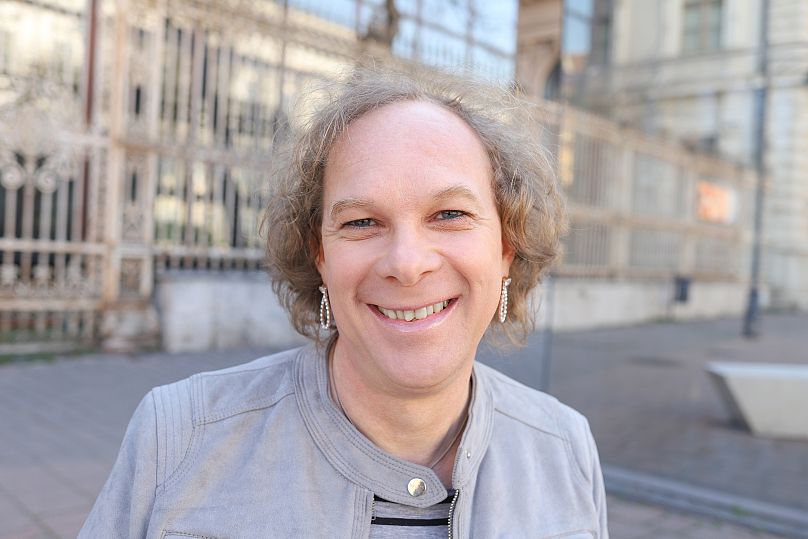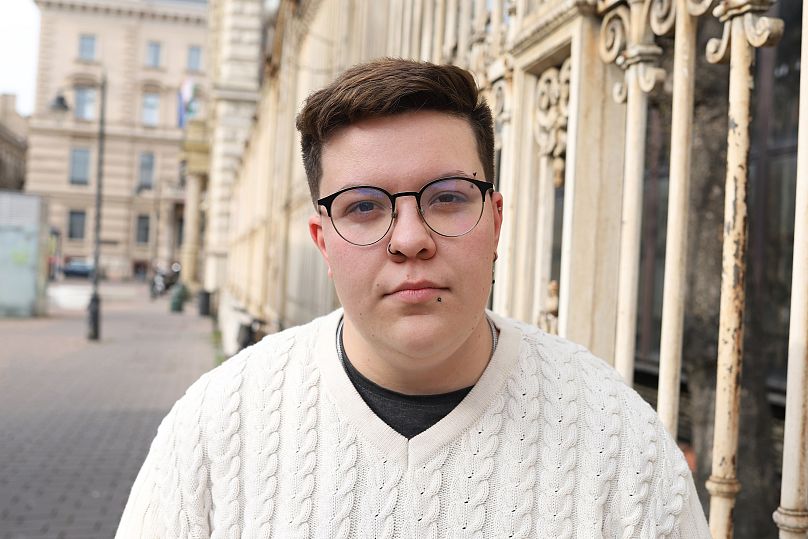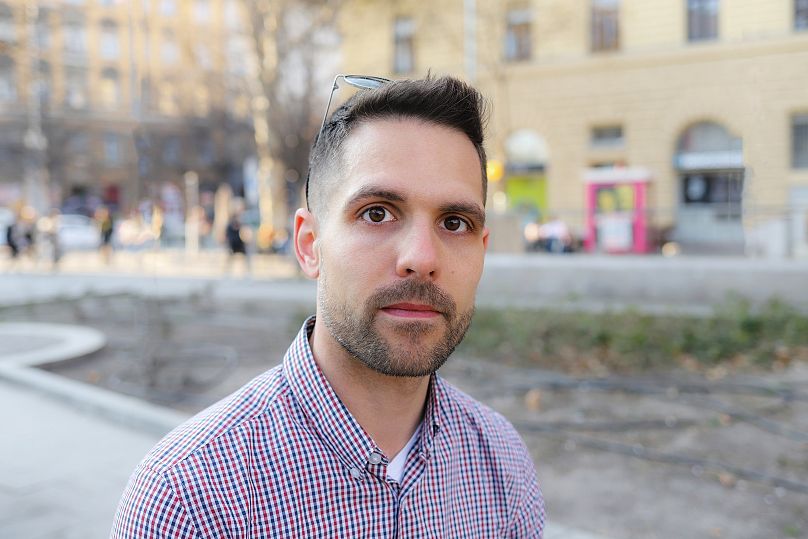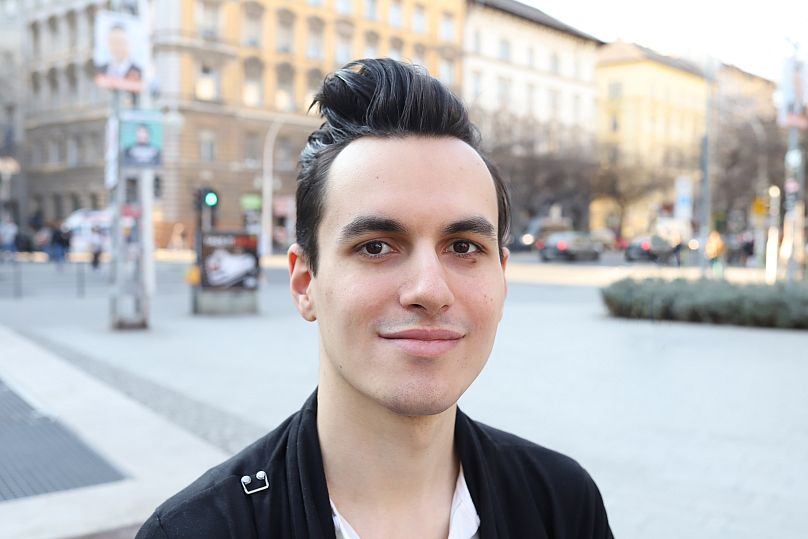Three of the four people Euronews spoke to said they might leave Hungary if LGBTQ rights do not improve.
Hungary is holding a controversial referendum on LGBTQ rights on Sunday (3 April), at the same time as a parliamentary election.
 ADVERTISEMENT
ADVERTISEMENT
 ADVERTISEMENT
ADVERTISEMENT
Voters will be asked for their views on legislation that limits schools' teaching about homosexuality and transgender issues.
Critics say the law, passed last year, was discriminatory, contravened European values and equates homosexuality with paedophilia.
Ahead of the vote, Euronews spoke to four members of Hungary's LGBTQ community to find out how they were feeling.
Three of them told us if things don't improve, they might not be living in Hungary much longer.
Mónika Magasházi: 'I wish the state would leave me alone'
"It's not that the state doesn't represent me or doesn't protect my rights. It's about being put on the spot and put in front of the gun."
This is how Mónika Magasházi summed up her feelings as a member of the LGBTQ community in Hungary in 2022.
"I no longer even think about being represented and protected by the state," Mónika added. "That's just in the dream category, now. I would be at least a bit happy if they would just leave me alone."
The 49-year-old trans woman has been on hormone therapy for about six months and is now preparing for her first reconstructive surgery.
She has been living as a woman for a year and a half, but it was the day of our interview that she first spoke to her boss at work about it.
In some ways, Mónika feels that coming out at work has even been made easier by the Hungarian government's handling of LGBTQ issues.
"I have a very strange feeling about this," said Mónika. "I feel very upset that the government has actually attacked us with this propaganda. It's coming out of the public media, it's coming out of the billboards. On the other hand, it can also be counterproductive for them. Because now that the government has shoved it in everybody's face, more and more families, work communities and friends are talking about it. In many ways, it's damaging to us, but maybe we don't need so much to explain. For example, I didn't need to explain so much to my boss," she said.
But that doesn't mean everything will go smoothly at work. Even if her colleagues and bosses accept the new situation without any problems, changing her IDs and email addresses in the IT system will be a more difficult task. Since May 2020, it is not possible to change the gender registered in the civil registry in Hungary, so Mónika cannot submit new documents with her new, female name. And IT systems are based on official documents and the employment contract at her workplace.
"The parent companies don't even understand this problem because they don't have it. If you are in transition in the West, you go to the office, get your new documents, bring them to the company and they will rewrite your details," she said, adding that if a woman who is in transition and looks like a woman has to show her male documents anywhere, it is very inconvenient.
Emmett Hegedűs: 'With the new law, my dreams became impossible'
Emmett Hegedűs, 18, is in a similar situation to Mónika. The new law has made it impossible for both of them to change their gender and name.
"I really don't like signing my name or taking out my ID. When I was 16, I had [the] motivation to go ahead in life and that was of course that in two years I wouldn't have to take out my female ID, I wouldn't have to menstruate or anything like that. With the change in the law, the dreams, the plans that I had built up became impossible," said Emmett, who has become an activist recently. His goal is to dispel fears in people about members of the LGBTQ community.
"If I don't know something and the first information I hear is that it's dangerous, I might believe it. Provided I otherwise agree with the decisions of the government from whom the information comes. It sounds very scary that someone would go up to your child and tell them to change gender," he said, referring to the upcoming referendum, about which he has strong views.
"No one in their right mind can say 'yes' to any of the questions with a clear heart. I don't want any of these statements to come true either. However, there is no reality to any of them. So it's a very evil way of amplifying the fear that people already have."
According to Mónika, the timing of the referendum is no coincidence:
"It is a disgusting thing. It is clearly about trying to somehow keep the Fidesz camp together and get them to the polls. They are hoping that they can mobilise these people by threatening to operate on kindergarten children. You can only give invalid answers to these stupid questions."
Márió Dányi-Nagy: 'Threats can suck the everyday joy out of your life'
Márió Dányi-Nagy also sees political motivation in the organisation of the referendum.
"It is held on election day to ensure a high turnout. On the other hand, they want to confuse things in people's minds, they want to suggest that Fidesz is protecting children from paedophiles."
The 35-year-old trainer from Budapest feels that as a gay man, the pressure has been mounting on him in recent years:
"It's annoying when someone starts shouting loudly next to you. But it is also annoying when something keeps buzzing constantly, louder and louder. That's kind of what's happening now," he said.
"My previous partner and I were harassed on the street many times, once physically, but it was more of a case of being called names. This causes self-censorship. I get the feeling that I am not safe in my own country because I could be attacked at any time. Politicians say things like I am not an equal citizen. And when it came to the association with paedophiles, it sent me to the floor. It was as if they had put a target on my back, that I was someone to be attacked. I bought pepper spray at the time, but I wasn't attacked in the end. But recently, for example, at the end of a date, a guy kissed me in a public place and it made me nervous, even though I didn't used to be like that. That kind of threat can suck the everyday joy out of your life."
Mário studies behavioural psychology and clearly sees the government's responsibility for the deterioration of the situation.
"It is coded in human behaviour to exclude, discriminate, hurt those who are not like the others," he said. "If you put the incendiary under this, it will be reinforced. And it needs real effort to promote not that, but acceptance, peace."
Last year, Mario started planning to move to Vienna, Austria, but eventually decided to stay because he felt that society was not as dismissive of him as the government. In the future, however, he can imagine leaving the country, just as our other interviewees are strongly considering moving - especially if Fidesz remains in power and introduces further restrictive measures with the new mandate.
Ákos Modolo: 'The law has given us visibility like never before'
"A lot of my friends have gone abroad because they don't feel valued by this country, they don't feel they can hold their heads high, they can't stand the rhetoric that is being hurled at them on a daily basis, and they are restricted by the laws," said Ákos Modolo, who wants to stay in Hungary.
"I went to Stockholm last year and it was like a sudden breath of fresh air. But in Budapest, I have a very good, supportive community of friends and a vibrant activist community. I know many authentic and courageous people who inspire me.
"In Stockholm, I saw that they already have what we are fighting for in Hungary, legally and in terms of social acceptance. I feel I have more work to do here," said the 27-year-old, who comes from a small town in the lowlands of Hungary, Mezőberény, and grew up in a conservative, religious community. He found out he was gay at the age of 14 but didn't tell anyone until he moved to Budapest at the age of 19.
"I felt that in the countryside the subject was taboo, or if they had spoken about it, they did it in a negative sense. For example, it was made fun of at school, or sometimes in a sermon it was said that it was a sin to live your homosexuality," he explained.
Akos said in his role as an activist he was targeted by the government. He used to hold gay awareness programmes mainly in secondary schools, but the new law means this is no longer possible. Instead, he targets universities, workplaces and bible study groups. According to him, the sessions were aimed at showing how LGBTQ people live, rather than being about sex education.
"Since the law was passed, we have not been able to go to secondary schools, even though two-thirds of our invitations used to come from secondary schools. Legally, the wording of the law is very vague, which shows that it is all about communication for Fidesz. It is also not clear if we really cannot go to secondary schools now by the text of the law. In any case, the teachers dare not invite us. Not even the most liberal ones, because they are afraid of retaliation, of being on the front page of the government media the next day for having engaged in sexual propaganda," he said.
Despite all the difficulties, however, Ákos believes that the situation of the LGBTQ community in Hungary is not hopeless.
"I see that the acceptance of LGBTQ people has increased recently, despite the political campaign. The laws have given us visibility like never before. Several of my conservative gay friends who used to vote for Fidesz and opposed me being an activist have come out and said enough is enough. We lost some battles in the short term, but I think we can be optimistic in the long term."














